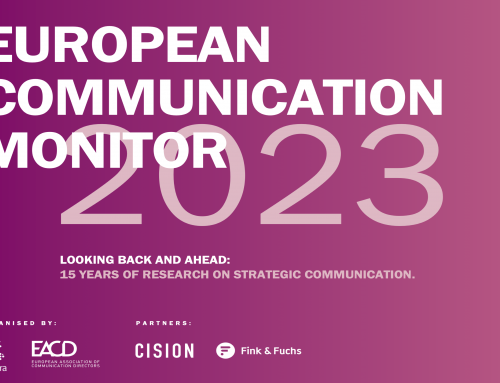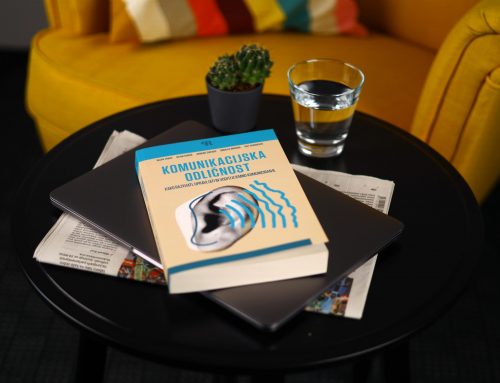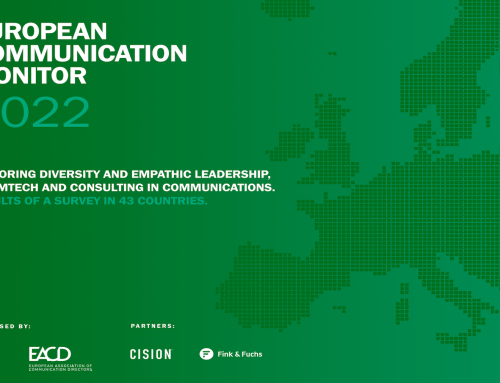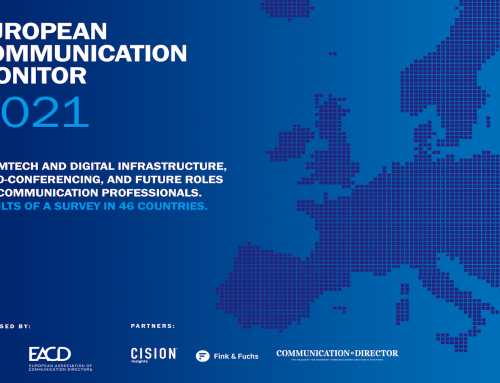 The European Communication Professionals Skills and Innovation (ECOPSI) research project is a spin-off of the ECM study. It aims to map and understand the actions and activities of communicators to build knowledge and understanding of what practitioners do, but also what skills and knowledge they need to develop to have a shared meaning and understanding of the practice.
The European Communication Professionals Skills and Innovation (ECOPSI) research project is a spin-off of the ECM study. It aims to map and understand the actions and activities of communicators to build knowledge and understanding of what practitioners do, but also what skills and knowledge they need to develop to have a shared meaning and understanding of the practice.
The programme maps and evaluates the current and future communication management skills of practitioners across Europe and fills a competency, skills and knowledge gap in the field of professional communication management by providing open source information resources for communication practitioner skills diagnosis and development.
This innovative programme was a partnership of six leading European universities in communication research and education located in Germany, Netherlands, Slovenia, Spain, Turkey and the United Kingdom as well as the European Association of Communication Directors (EACD) and funded by the European Union.
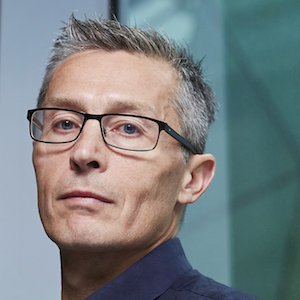 The two-year programme led by Professor Ralph Tench at Leeds Beckett University (then: Leeds Metropolitan) was the first and largest study of public relations and strategic communication to be funded by the European Union.
The two-year programme led by Professor Ralph Tench at Leeds Beckett University (then: Leeds Metropolitan) was the first and largest study of public relations and strategic communication to be funded by the European Union.
The research included quantitative and qualitative data collection from practitioners. An online survey was developed with questions focused on hypotheses for the ECOPSI project about the education, skills and competencies of communication practitioners. The online survey was then distributed via professional networks to communication practitioners from 42 countries across Europe as part of the ECM survey. To support the quantitative data, 53 in-depth interviews were conducted to gain a deeper understanding on four defined roles: (1) chief communications officer, (2) crisis communications manager, (3) internal communications manager, and (4) social media manager.
The study provided in-depth insights into the competencies needed for these four distinct communication roles and developed a Communication Role Matrix. The Communication Role Matrix captures what it is a communication professional does and the requirement necessary to perform the role successfully by identifying the knowledge, skills (hard and soft) and personal attributes for each role (Tench et al. 2013, Tench and Moreno, 2015).
 The results of the study: (1) analyses the construction and perceptions about the Communication Role Matrix; (2) highlights current contemporary issues faced by the industry; and (3) presents the transference of knowledge from ECOPSI to the professional field through the Portal (for) Advancing Communication Expertise (p4ace) along with a self-diagnostic tool aimed to engage practitioners in continued professional development.
The results of the study: (1) analyses the construction and perceptions about the Communication Role Matrix; (2) highlights current contemporary issues faced by the industry; and (3) presents the transference of knowledge from ECOPSI to the professional field through the Portal (for) Advancing Communication Expertise (p4ace) along with a self-diagnostic tool aimed to engage practitioners in continued professional development.
Key insights
There is little organised life-long learning in public relations and communication management in Europe. Consequently senior communication practitioners believe there are major failings in capabilities related to our profession which if not addressed will serve as significant challenges for European organisations over the next 10 years, according to the findings of the largest EU funded project into strategic communication until now.
That is one of the most important findings from the ECOPSI project that includes academic partners from the United Kingdom, Germany, Spain, Netherlands, Slovenia and Turkey. These partners are; Leeds Beckett University, University of Leipzig, University Rey Juan Carlos, University of Amsterdam, University of Ljubljana, Istanbul University as well as a leading professional organisation; the European Association of Communication Directors (EACD). The findings of this intensive 15-month research programme are based on survey data from more than 40 countries and 53 in-depth interviews with chief communication officers and professionals from organizations such as Shell, Henkel, McDonalds and Daimler AG.
Professor Ralph Tench, project leader of ECOPSI says:
“The context for this project is a communication sector in Europe, which has grown and developed significantly over the last 20 years. This expansion has been influenced by political, economic and cultural shifts, which have seen profit, and non-profit organisations equally recognise the role and significance of communication in achieving organisational goals. This project contributes to the development of the communication practice across Europe by mapping and evaluating the current and future communication management skills of practitioners across Europe.”
The research programme is oriented around the ECOPSI Communication Role Matrix. The team has been able to significantly expand the knowledge and understanding on the key questions for the ECOPSI project, which is to develop insight into the current competencies of communications specialists in Europe, as well as understanding of their future development needs.
Six major conclusions
- The findings suggest there is little organised life-long learning or evidence of recognized CPD pathways and the value of formal undergraduate and postgraduate education is questioned. The profession needs to challenge both what Communication and PR education currently consists of and how it is delivered.
- Social media knowledge is acknowledged as a weakness people feel they need to improve in. “More specifically”, Ralph Tench notes, “the majority of practitioners feel they need a greater understanding of its strategic application”.
- The industry needs to look closely at how it can foster intercultural relationships and cross-cultural working by setting up accredited and recognised programmes of exchange/secondment/internship with different companies in different countries. Existing student exchange programmes, such as Erasmus were held in particularly high regard.
- Models of coaching and mentoring within the sector need to be devised and shared in an attempt to offer more formal, organised and supported career development that is on-the-job and in-situ. This could involve internal and external schemes, which again could be certified or accredited by a professional association or body.
- The value of observing others and learning from them is noted. Networks and Forums are a recognised support for practitioners at senior and lower levels but there may well be a gap in the middle ranks where professionals are more guarded of sharing knowledge, experience and weaknesses.
- Finally, there is evidence of an emerging future need to be a ‘generalist communications specialist’.
 These findings are based on data that has been collected in two forms; (1) quantitative, through an online survey of nearly 2,200 practitioners in 42 countries as part of the annual European Communications Monitor survey and (2) qualitatively through focus groups and interviews. Focus groups were held with four role groups: chief communications officers, crisis communicators, internal communicators and social media managers. Interviews have been held across 6 geographically distinct regions of Europe with a total of 53 communications practitioners at different levels and performing different roles within renowned organisations such as Shell, Philips, Henkel, DHL.
These findings are based on data that has been collected in two forms; (1) quantitative, through an online survey of nearly 2,200 practitioners in 42 countries as part of the annual European Communications Monitor survey and (2) qualitatively through focus groups and interviews. Focus groups were held with four role groups: chief communications officers, crisis communicators, internal communicators and social media managers. Interviews have been held across 6 geographically distinct regions of Europe with a total of 53 communications practitioners at different levels and performing different roles within renowned organisations such as Shell, Philips, Henkel, DHL.
Professor Tench commenting on the importance of the report’s findings added:
“In order for organisations to gain a competitive advantage in the market in the future, practitioners will need to understand and make sense of the competency gaps we have identified in many areas. For example in addition to the obvious technology transformations an emerging trend is the growing importance of working as a member of a virtual team, which brings both opportunities and threats. We need to build teams with the skills and competencies to manage this kind of practical change.”
 The ECOPSI research report is freely available from the ECOPSI website and further below. Infographics and other information about the background and the project are also freely available. The ECOPSI programme continues to present the findings of the research report at several communication conferences across Europe. Moreover, to move this agenda forward an online diagnostics tool P4ACE – Portal 4 Advanced Communications Education is available that supports individual practitioners in benchmarking their current knowledge, skills and personal attributes.
The ECOPSI research report is freely available from the ECOPSI website and further below. Infographics and other information about the background and the project are also freely available. The ECOPSI programme continues to present the findings of the research report at several communication conferences across Europe. Moreover, to move this agenda forward an online diagnostics tool P4ACE – Portal 4 Advanced Communications Education is available that supports individual practitioners in benchmarking their current knowledge, skills and personal attributes.
Further explanations by Hasina Juma, member of the ECOPSI project team (Leeds)
Background and credits
Organisers and funding
This innovative programme was a partnership of six leading European universities in communication research and education located in Germany, Netherlands, Slovenia, Spain, Turkey and the UK as well as the European Association of Communication Directors (EACD) and funded by the European Union.



